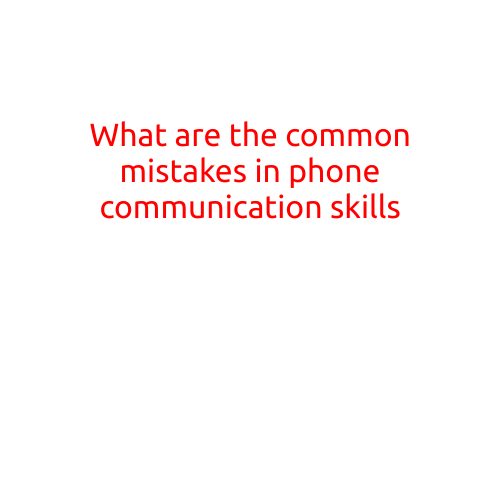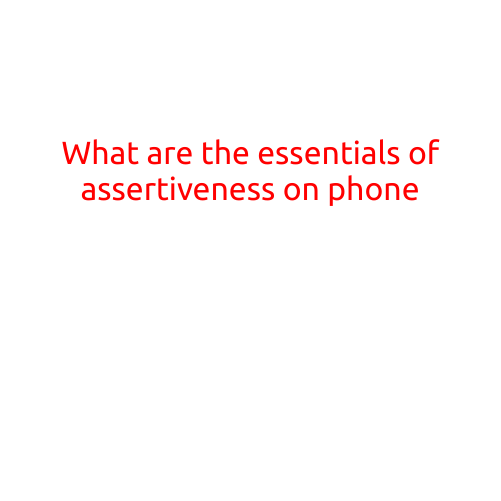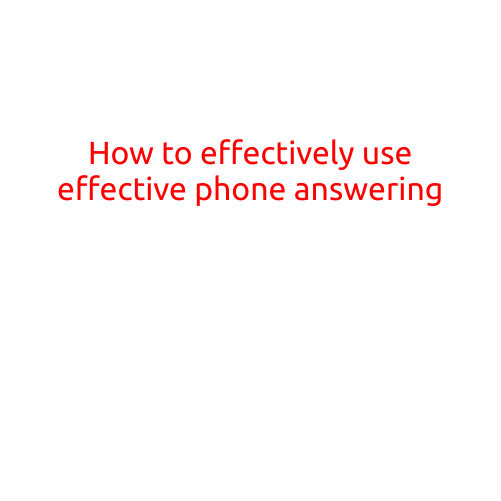
What Are the Common Mistakes in Phone Communication Skills?
In today’s fast-paced business world, phone communication is an essential tool for professionals to stay connected with colleagues, clients, and customers. Effective phone communication can make or break a business deal, lead to new opportunities, or damage relationships. However, many people struggle with phone communication skills, making common mistakes that can have detrimental consequences. In this article, we will highlight some of the most common mistakes in phone communication skills and provide tips on how to avoid them.
Mistake #1: Poor Preparation
Before picking up the phone, it’s essential to prepare yourself for the call. This includes:
- Researching the person or company you’re about to talk to
- Knowing the purpose of the call
- Having all relevant information and materials ready
- Eliminating distractions and minimizing noise
Why it’s a mistake: This lack of preparation can lead to confusion, awkwardness, and poor communication. Make sure to prepare yourself before making the call.
Mistake #2: Not Listening
Active listening is a crucial aspect of phone communication. However, many people struggle to listen attentively, leading to misunderstanding and miscommunication.
Why it’s a mistake: Failing to listen can result in misinterpreting the message, missing crucial information, or apologizing for something that wasn’t said. Make sure to actively listen by maintaining eye contact (even if you’re talking on the phone!), asking clarifying questions, and paraphrasing what the other person says.
Mistake #3: Monologuing
Phone calls can sometimes feel like an interrogation, where one person does all the talking and the other person is only there to respond. This monologuing can lead to boredom, confusion, and disengagement.
Why it’s a mistake: Monologuing implies that the other person’s input is not valued or respected. Make sure to share the conversation and ask open-ended questions to encourage the other person to participate.
Mistake #4: Not Being Clear
When communicating over the phone, it’s easy to get stuck in jargon, acronyms, or technical terms that may not be familiar to the other person. This can lead to confusion and miscommunication.
Why it’s a mistake: Using unclear language can cause misunderstandings, lead to mistrust, and damage relationships. Make sure to use simple, concise language that is easy to understand.
Mistake #5: Not Following Up
Phone calls often require follow-up actions, such as sending emails or documents. Failing to follow up can lead to lost opportunities and damaged relationships.
Why it’s a mistake: Not following up implies a lack of attention to detail, lack of discipline, and poor time management. Make sure to schedule follow-up calls and keep track of your actions.
Mistake #6: Talking Too Much
Phone calls have a tendency to turn into long, rambling conversations. Failing to keep the conversation concise and focused can lead to boredom, disengagement, and missed opportunities.
Why it’s a mistake: Talking too much can be perceived as self-centered, dominant, or even insincere. Make sure to keep the conversation balanced and concise by asking questions and allowing the other person to share their thoughts.
Mistake #7: Not Being Prepared to Make Decisions
Phone calls often require decision-making on the spot. Failing to prepare for this can lead to hesitation, indecision, or even delays.
Why it’s a mistake: Not being prepared to make decisions can cause delays, lost opportunities, or damaged relationships. Make sure to think ahead and be prepared to make decisions quickly.
Mistake #8: Not Being Clear with Directions or Instructions
Phone calls often involve providing instructions, feedback, or guidance. Failing to be clear or specific can lead to confusion, miscommunication, and frustration.
Why it’s a mistake: Not being clear with directions or instructions can cause misunderstandings, mistakes, or wasted time. Make sure to communicate clearly and provide specific instructions.
Mistake #9: Not Being Professional
Phone calls are an extension of your professional reputation. Failing to maintain a professional tone, language, and demeanor can damage relationships, reputation, and even business opportunities.
Why it’s a mistake: Not being professional can be perceived as unprofessional, unprepared, or even untrustworthy. Make sure to maintain a professional tone, language, and demeanor throughout the call.
Mistake #10: Not Following Up with a Summary or Recap
Phone calls often involve complex discussions, agreements, or action items. Failing to provide a summary or recap can lead to misunderstandings, missed opportunities, or lost information.
Why it’s a mistake: Not providing a summary or recap implies a lack of attention to detail, lack of discipline, and poor time management. Make sure to provide a summary or recap to ensure that all parties are on the same page.
In conclusion, effective phone communication skills are crucial for success in business and personal relationships. By avoiding common mistakes such as poor preparation, not listening, monologuing, not being clear, not following up, talking too much, not being prepared to make decisions, not being clear with directions or instructions, not being professional, and not following up with a summary or recap, you can improve your communication skills and build stronger relationships. Remember to actively listen, communicate clearly, and maintain a professional tone and demeanor to make a positive impression and achieve your goals.





